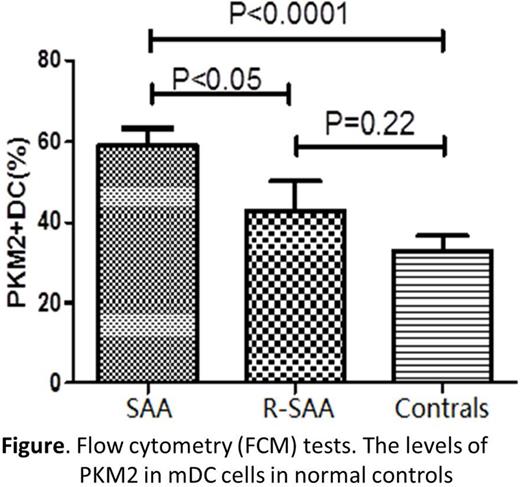Abstract
Severe aplastic anemia (SAA) is a hematologic disease characterized by pancytopenia with severe bone marrow failure. Our previous studies have demonstrated that activated myeloid dendritic cells (mDCs) increased in the bone marrow of SAA patients, which might promote Th0 cells to polarize to Th1 cells and cause the subsequent over-function of T lymphocytes and hematopoiesis failure in SAA. The other notable finding in our study is that abnormal expression of pyruvate kinase M2 (PKM2) in mDCs from SAA patients may be one of the reason for mDC hyperfunction. Human pyruvate kinase M2, which catalyzes the last but rate-limiting step of glycolysis, is exclusively expressed in actively proliferated cells ,especially in embryonic and adult dividing/tumor cells. It remains unclear how PKM2 may change in patients with SAA. This study aims at exploring the role of PKM2 in SAA. In this study, the quantitative changes of mDCs in peripheral blood of 15 SAA patients before immunosuppressive therapy (IST) °¢ 13 SAA patients after IST and 26 normal controls were determined by flow cytometry. Results showed that the levels of PKM2 in mDCs were significantly increased in SAA patients(59.1±15.8)%. After IST, the levels of PKM2 in mDCs decreased(42.6±22.1)% (P<0.05).In normal controls group , the level of PKM2 in mDCs was (32.7±20.2)%. These changes reveal that dysregulation of PKM2 expression and activation in mDCs from SAA patients may contribute to hyperfunction of mDCs, thus leading to the imbalance of downstream Th1/Th2 subsets which followed by hematopoiesis failure in SAA.
No relevant conflicts of interest to declare.
Author notes
Asterisk with author names denotes non-ASH members.



